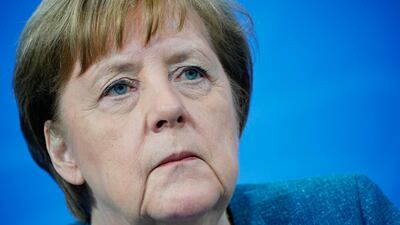Chancellor Angela Merkel said on Monday that Germany would make available Covid-19 vaccinations to all adults in June.
The announcement was based on projections that the country would receive 80 million doses from makers before July.
After a meeting with the governors of Germany’s 16 states, Mrs Merkel said that depending on the number of vaccines delivered, the existing system of prioritising the most vulnerable would be dropped in June at the latest.
“This doesn’t mean that everyone will immediately be able to get vaccinated,” she said. “But everyone will be able to try for a vaccine appointment.”
As with other EU countries, Germany’s vaccine campaign began slowly in December, with only 10 per cent of the population having their first shot by the end of March.
Due to limited supply, the elderly, people with with existing conditions and medical and care professionals were given priority.
The distribution has picked up speed significantly in recent weeks.
Official figures show 23.4 per cent of the population had received at least one dose of vaccine by Sunday and about 7.2 per cent of Germany’s 83 million people had received both.
After supply problems and concerns over efficacy and rare blood clots with the AstraZeneca vaccine, Germany has relied on the shots made by local company BioNTech and its US partner Pfizer.
About 50 million doses of that vaccine are expected to be delivered in the second quarter, Mrs Merkel said.
She and the governors discussed whether people who were fully vaccinated against Covid-19 should be exempt from restrictions in place to curb the spread of the virus, although no decision was made.
The issue of special privileges for vaccinated people has been hotly debated in Germany, as in other countries.
Some there say it is unfair on those who have not been able to receive the shot yet.
Others say restrictions on civil liberties are justified while people pose a risk to others.
Mrs Merkel quoted a recent report from Germany’s disease control agency, which concluded that people posed “no relevant risk” to others 14 days after they’ve received a second dose of vaccine.
This would mean they could be treated like people who tested negative for the coronavirus or who recovered from infection.
But Mrs Merkel cautioned that at some point Germany would find itself in a “transition phase that also won’t be easy", when about half of the population has been vaccinated.
Figures on the weekly infection rate for every 100,000 inhabitants, to which many of Germany’s pandemic restrictions are linked, would then effectively be much higher than they appear because they apply to a smaller share of the population, she said.
Germany is considering buying the Russian-made vaccine Sputnik V, Mrs Merkel said, but that would depend on when the European Medicines Agency approves the shot for use in the EU.
“The documentation isn’t yet sufficient for authorisation,” she said.
“If this authorisation is received very soon, then it will of course still make sense to buy doses of Sputnik.
If this only happens in several months then we’ll already have enough vaccine.”


